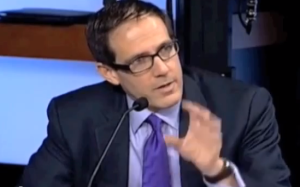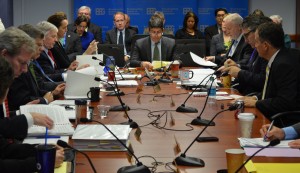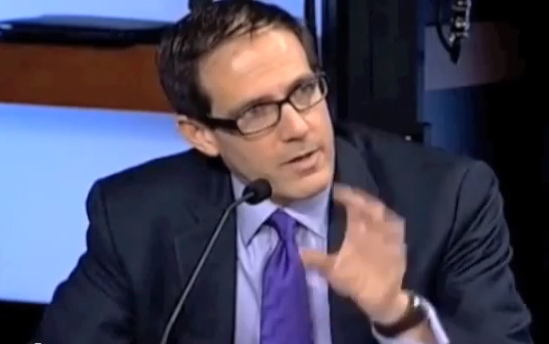BBG Watch Commentary

Members of the bipartisan Broadcasting Board of Governors (BBG), which supervises the work of U.S. taxpayer-funded Voice of America (VOA), are concerned about its top executive’s definition of VOA’s mission, management issues, including some of its managers whom they see as responsible for poor employee morale, and inferior quality of VOA news reporting and website management.
Some of these concerns were reflected at the December 18, 2013 open board meeting in Washington, DC in a question from BBG Governor Matt Armstrong to VOA Director David Ensor after Ensor’s presentation about VOA.
Armstrong has been taking to various rank and file VOA media professionals and heard their complaints about the top management at the U.S. taxpayer-supported international media outlet. He has also been checking VOA websites and sharing his concerns with the VOA Director.
At the open BBG board meeting in Washington on Wednesday, Armstrong made voiced his concerns in public, which may be an indication of his frustration with the VOA management.
Not pulling any punches, Armstrong noted that in his review of VOA English and some of the foreign language websites he discovered serious deficiencies in news coverage and asked how VOA Director Ensor plans to address this problem.
“Every time there is a breaking news event — I’m not talking about a car chase or a white Bronco on a freeway — I go to VOA websites, not just English, but the other websites, those that I can sort of ascertain, realize … I’ve actually studied three other languages … not that I can speak any of them, and I also use Google translate to try to help me, and then I get the pictures and look at the general layout, and what I find surprising is what appears to be the lack on the website of any event and that we lag significantly behind other media outlets whether they would be our direct tier-one competitors, whether it it is CCTV, Russia Today, CNNI, BBC, whatever it’s going to be. And then when we do file a story, it seems it’s thin at the least, especially when I compare it to these other offerings. And so when I want to pick on the VOA English website — and you make a comment that English is number one audience with 35 million — it seems to me that with English being a major audience for you and lingua franca around the world and if we want to build VOA as a premier news and information provider around the world that there should be a greater integration and timeliness and completeness of news and information on the web, not just in English.” — BBG Governor Matt Armstrong
Ensor’s response to Governor Armstrong was that “this is a resource question.” He would not admit, as many critics point out, that this is also, if not primarily, an issue of poor management. Critics point to Ensor’s retention of controversial managers, some with anger management issues, who have alienated the workforce. In his answer to Governor Armstrong, Ensor made it clear that he relies on these managers to solve any problems that may exist.
Ensor said that VOA language services and regional desks of the VOA Newsroom provide unique news content and that the news reporting system is good even if it is under-resourced. Internal and external critics say the system has been broken for many years. Protests from VOA journalists addressed to Ensor, his deputy VOA Executive Editor Steve Redisch and other top VOA managers have been repeatedly ignored.
According to internal critics, the biggest problem is not inadequate coverage of news that should be generated by VOA language services and shared with VOA Newsroom but are not — although this also happens frequently because VOA language services operate with very few resources. A far bigger problem is inadequate coverage of basic U.S. and international news, including coverage of U.S. foreign policy-related news developments.
According to critics, VOA executives have been responsible for putting in place an unworkable and failing news reporting structure.
Because some top executives appear weak and other managers are incapable of seeing the problems, listening to input, proposing solutions and motivating the workforce to implement them, but instead alienate rank and file journalists, the Voice of America has lost its ability to deliver news reliably and has plunged into the greatest employee morale crisis perhaps in its entire history. Ensor, however, blamed budget and job cuts as causing poor employee morale. He also noted that there was a slight improvement in employee morale this year. It happened after the agency spent thousands of dollars on a consulting firm to get more employees participate in the federal survey. The agency still ended up this year at the very bottom of all federal agencies.
Executive Director of the Committee for U.S. International Broadcasting, Ann Noonan, who spoke as a member of the public shortly before Ensor’s presentation, also raised concerns about VOA’s management and recent news coverage failures that resulted in late, superficial and sometimes erroneous reporting on U.S. foreign policy and statements on Ukraine from Vice President Biden and Senator McCain. She called for urgent personnel and management reforms not only at VOA but also at IBB. Some management reforms at the BBG’s International Broadcasting Bureau (IBB) have been announced by BBG Chairman Jeff Shell at the December 18 BBG meeting.
Noonan praised the original reporting work of the VOA Ukrainian Service, as well as Radio Free Europe / Radio Liberty (RFE/RL) reporting from Ukraine. She also applauded RFE/RL CEO Kevin Klose for his management reforms while urging further reforms of RFE/RL personnel policies to improve treatment of foreign-born journalists from many countries working for the surrogate media outlet.
BBG Governor Ryan Crocker made a point that VOA executives might think about specializing more in reporting on U.S. political news and views, which is one of the requirements of the VOA Charter. He and Governor Kenneth Weinstein also asked questions about VOA Persian Service as did Assistant Secretary of State for Public Affairs Douglas Frantz, who was designated by Secretary of State John Kerry – a BBG board member – to represent him at today’s meeting.
Governor McCue asked David Ensor about management issues that affect employees morale.
In asking questions about VOA’s role in U.S. international media outreach, BBG Governors who spoke seemed more concerned about mission and impact than with raw audience statistics.
Jeff Shell asked David Ensor where he would employ any additional resources if they became available. Ensor said that he would focus on U.S. national security issues and countries of strategic interest for the United States. Ensor did not mention the need to improve news coverage and management. He did, however, mention in response to a question from Governor Armstrong plans to fill six positions on the VOA web desk.
After David Ensor’s presentation, Jeff Shell introduced Netflix CEO Reed Hastings as the keynote speaker for a panel discussion on the transition of international media organizations in the digital age.
Overall, it was probably the best and the most promising BBG meeting in recent history.
We applaud Governor Armstrong for asking his questions.
BBG PRESS RELEASE
Board Paves Way For Ongoing Restructuring And Innovation
DECEMBER 18, 2013

The Broadcasting Board of Governors today announced an interim management structure, took an in-depth look at the Voice of America and hosted a rich discussion on technology and innovation with key industry leaders.
The Board agreed to divide the responsibilities of the recently retired IBB Director among three members of the senior management team in order to help pave the way for a future Chief Executive Officer. Under this interim structure, André Mendes will serve as Director of Global Operations, Robert Bole will be Director of Global Strategy, and Suzie Carroll will serve as Director of Global Communications. Together they will lead the agency in an arrangement that is expected to begin in January, pending congressional approval.
“These individuals were chosen because they are forward thinkers and change agents,” said Chair Jeff Shell. “We are extremely committed to bringing on board a CEO, and this interim management structure will prepare the organization for that reform.”
Mendes, Bole, and Carroll will provide, in their respective areas, oversight and direction to the Director of the Voice of America, the Director of the Office of Cuba Broadcasting, and all other offices of the federal agency. The three will work together until a CEO is selected and hired. Governor Matt Armstrong will serve as the Board’s Management Liaison.
Jeff Trimble, IBB Deputy Director, will transition to a new role to be announced separately. Shell thanked Trimble for taking the helm of the IBB management team after IBB Director Dick Lobo’s retirement.
After the regular business meeting, including comments from the public, the Board held a 90-minute “deep dive” session focused on the Voice of America. Before a live studio audience, VOA Director David Ensor reviewed the network’s worldwide activities, distribution and effectiveness, illustrating his talk with numerous examples of excellent work by VOA journalists. Ensor also fielded questions from the Board concerning mission, allocation of resources, and audience engagement.
The technology and innovation panel opened with a discussion between Shell and Reed Hastings, CEO of Netflix, about the challenges of steering a large international media organization. Hastings was then joined by Macon Phillips, Coordinator of the State Department’s Bureau of International Information Programs, and Tom Cochran, Chief Technology Officer of Atlantic Media, in a panel moderated by Bole. An engaging conversation followed between the panelists, governors, and assembled audience on topics including measuring impact, developing partnerships and revitalizing content strategies.
All three segments of the Board meeting were live streamed online and are available for viewing here.
